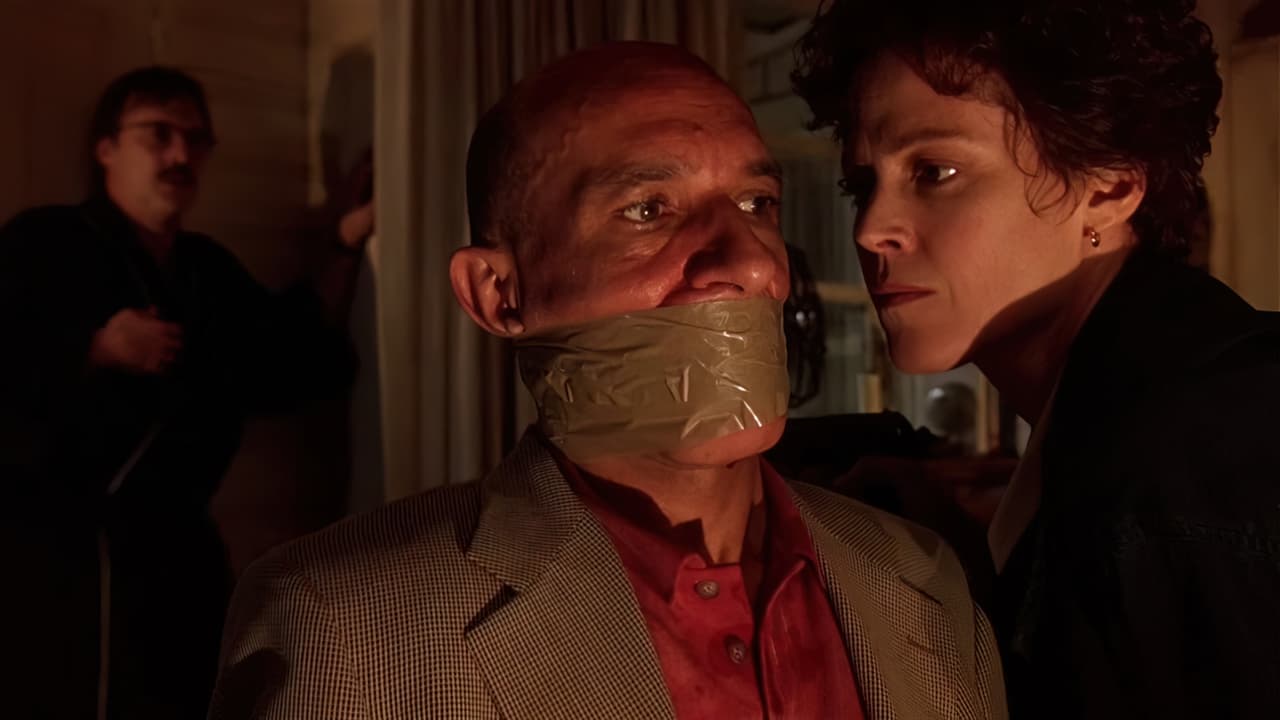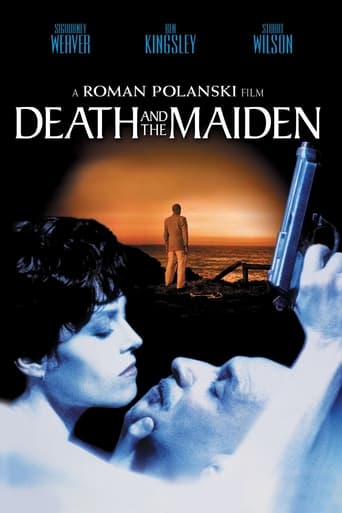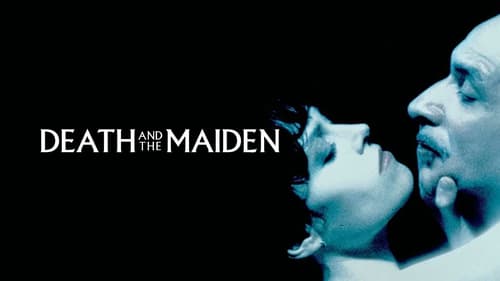



Really Surprised!
This movie was so-so. It had it's moments, but wasn't the greatest.
View MoreThis story has more twists and turns than a second-rate soap opera.
View MoreThe movie is wonderful and true, an act of love in all its contradictions and complexity
View MoreDeath and the Maiden is a good film. I can't say it's great, and I definitely cannot say it is bad. I have been watching a lot of Polanski lately, I am intrigued by how interesting his work is. He makes movies that I would not say are great by any means, but they just work very, very, very well. It's a weird dynamic. I can't say he's even my favorite director, but I know no other directors I can say are better.This movie is really good, and takes place mainly in the confines of a small house in Latin America. It does not feel claustrophobic, and the dialogue is absolutely great. The action and feeling you can get from an entire movie shot in one house is amazing. Watch this film!7 Stars!!
View MoreRoman Polanski does something that is not easy here: he transfers a play to the screen, and never lets you forget that it is a play you're watching, but he makes it completely cinematic at the same time. The play itself is a great enigma about truth, doubt, vigilantism and justice. I don't want to give away the ending, but it is masterfully designed and executed. It's an intense and compelling film, the kind that invites long debates after it's over. The three leads are perfectly cast: Weaver and Kingsley are at the peak of their powers, but Wilson is much more than just "a third wheel". *** out of 4.
View MoreConsidering that this is a play and rather looks like one, it's pretty good. Well, it's good anyway.A lawyer, Gerardo (Stuart Wilson) and his wife Paulina (Sigourney Weaver) have just retired in their comfortable, isolated house next to a cliff overhanging the sea. The location is somewhere in South America, in a country that has just emerged from despotism and become a democracy. A car has trouble on the road in front of their house. Dr. Miranda (Ben Kingsley) rouses them and asks for help, but an electrical storm has knocked out both the power and the phone.Gerardo and Dr. Miranda are chatting in the living room while Paulina is still in bed. Hearing Miranda's voice, she sits up in alarm, sneaks outside, burns off in Miranda's car and pushes it over a cliff.That, I guess, is the end of Act I. Most of the time we spend with Gerardo and Miranda in the living room. The two men are at loose ends and drink themselves into a cheerfully befuddled state. I can't remember many drunk scenes better than this one. Kingsley, in particular, is given marvelous lines and delivers them as if they were gifts to the audience -- cynical, ironic, high brow, amiable. "I would like to quote Nietzsche in a situation like this," says Kingsley. "At least I think it was Nietzsche. Maybe it was Freud." Gerardo, "If you can remember a quotation, it's usually Freud." The dialog is delicious and matter of fact. The two men are sitting on the porch steps, still thinking Paulina is asleep, musing about where a thief might have driven Miranda's car, and why. "I'm an idiot," says Kingsley. "I'm running down the road yelling 'That's my car!' Of course the thief knows that. That's the whole POINT." Later, when they find out that Paulina has stolen the car, "I mean, what is this -- a regular thing or what? How long do you think we might have to wait? A day or two? A month?" Then the humor dwindles to a palpitating point and vanishes, and the movie becomes echt-serious. Paulina claims that Miranda worked as an interrogator for the now-deposed dictatorship and that he beat, tortured, and raped the women who were his prisoners -- Paulina included. (She's explicit about the techniques.) Gerardo thinks she's crazy. Miranda is astonished and scared to death.Paulina has Miranda tied up and puts him on trial, appointing Gerardo his defense counsel. Some "trial"! If Miranda confesses and shows genuine contrition she'll let him go, otherwise she'll shoot him through the head. Miranda, sensibly, is perfectly willing to confess and get out of this mad house but, since he claims to have had nothing to do with the previous regime, he doesn't know what to confess to. Paulina wants details -- what was she tied up with, ropes or wires? -- that Miranda says he is unable to provide.It's a harrowing movie, with occasional arcs of electricity jumping through it. I'm not certain the ending is played exactly as it would be in real life, but it hardly matters because the acting on the part of all three principals is unimpeachable.I don't want to give away the climax but I'll sum up my impression by saying that it's quite possible to be guilty OR innocent, while still being mad.See it if you can. It's a hard film to forget.
View MorePolanski surprises again with this thriller concerning one woman's attempt to exorcise the demons of her past by brutalising a man she holds responsible for the torture she endured almost twenty years earlier. The screenplay from Rafael Yglesias and Ariel Dorfman (based upon Dorfman's play) manages to keep us guessing as to each player's next move, and as to the truth about Roberto (Kingsley).Sigourney Weaver is electric as Paulina, the woman seemingly driven to madness when confronted with this horrific ghost from her past. Her performance is at times truly terrifying. Ben Kingsley's turn as the questionable Roberto leaves no doubt as to his versatile acting talents, as he portrays with ease probable innocence, possible guilt and desperation all at once. Stuart Wilson is the unfortunate third party, and never has enough to do as the husband caught in the middle of this frightening situation. Editing from Herve de Luze is taught and cinematography from Tonino delli Colli is suitably confined.Polanski effortlessly keeps us on the edge of our seats as he at once jolts and surprises us throughout his pic. Yet in going for all out entertainment in his beloved Hitchcockian fashion, he has avoided the many contentious issues that this film raises. Gender domination, sexual assault, justice, revenge and even forgiveness are all skimmed over as Polanski charges through the subtleties of the narrative in favour of the thrill. Hey, who's complaining?Monday, June 16, 1997 - Hoyts Croydon
View More